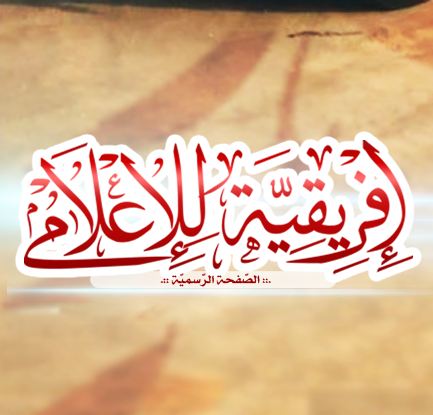
____________
To inquire about a translation for this video message for a fee email: [email protected]
Category: Tunisia
New video from Ifrīqīyyah Media: "Hinshīr Hill: Fire and Iron Revenge For the People of Tawḥīd"

____________
To inquire about a translation for this video message for a fee email: [email protected]
Ifrīqīyyah Media presents a new statement from Katībat ‘Uqbah Ibn Nāfi': “Information, Reminders, Coded Messages, Advice, and Warning"

Click the following link for a safe PDF copy: Katībat ‘Uqbah Ibn Nāfi’ — “Information, Reminders, Coded Messages, Advice, and Warning”
____________
To inquire about a translation for this statement for a fee email: [email protected]
al-I’tiṣām Media presents a new video message from The Islamic State: "Message to the People of Tunisia"

_____________
To inquire about a translation for this video message for a fee email: [email protected]
Ifrīqīyyah Media presents a new statement from Katībat 'Uqbah Ibn Nāfi': "Glad Tidings on the Martyrdom of Five Mujāhidīn"
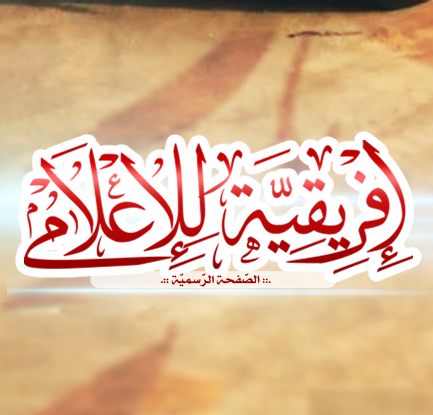
Click the following link for a safe PDF copy: Katībat ‘Uqbah Ibn Nāfi’ — “Glad Tidings on the Martyrdom of Five Mujāhidīn”
____________
To inquire about a translation for this statement for a fee email: [email protected]
New statement from Ifrīqīyyah Media: "Glad Tidings To Our People In Tunisia, First In the Second Ifrīqīyyah"
Click the following link for a safe PDF copy: Ifrīqīyyah Media — “Glad Tidings To Our People In Tunisia, First In the Second Ifrīqīyyah”
__________
To inquire about a translation for this article for a fee email: [email protected]
al-Bayyāriq Foundation for Media presents a new statement from Anṣār al-Sharī’ah in Tunisia: "Congratulations On the Occasion Of a Blessed Month Of Ramaḍān 1435 H"
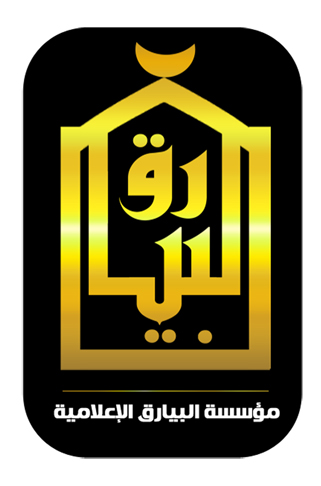
Click the following link for a safe PDF copy: Anṣār al-Sharī’ah in Tunisia — “Congratulations On the Occasion Of a Blessed Month Of Ramaḍān 1435 H”
___________
To inquire about a translation for this statement for a fee email: [email protected]
al-Bayyāriq Foundation for Media presents a new statement from Anṣār al-Sharī’ah in Tunisia’s Abū ‘Iyāḍ al-Tūnisī: "Inspired By the Conquests of Iraq"
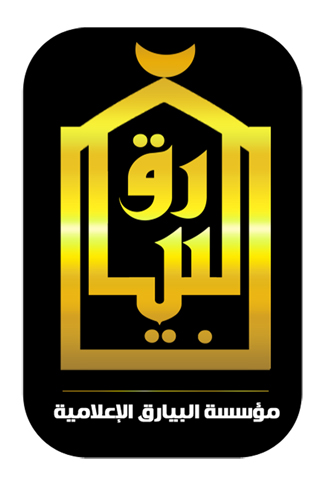
Click the following link for a safe PDF copy: Abū ‘Iyāḍ al-Tūnisī — “Inspired By the Conquests of Iraq”
__________
To inquire about a translation for this statement for a fee email: [email protected]
al-Andalus Media presents a new statement from al-Qā’idah in the Islamic Maghrib: "Revenge For the Free Tunisia: Targeting the Interior Minister 'Luṭfī Bin Jiddū'"

Click the following link for a safe PDF copy: al-Qā’idah in the Islamic Maghrib — “Revenge For the Free Tunisia- Targeting the Interior Minister ‘Luṭfī Bin Jiddū'”
________
To inquire about a translation for this statement for a fee email: [email protected]
GUEST POST: Ansar al-Sharia in Tunisia’s Social Media Activity in 2014
NOTE: As with all guest posts, the opinions expressed below are those of the guest author and they do not necessarily represent the views of this blogs administrator and does not at all represent his employer at the Washington Institute for Near East Policy.
Jihadology.net aims to not only provide primary sources for researchers and occasional analysis of them, but also to allow other young and upcoming students as well as established academics or policy wonks to contribute original analysis on issues related to jihadism. If you would like to contribute a piece, please email your idea/post to azelin [at] jihadology [dot] net.
Click here to see an archive of all guest posts.
—
Ansar al-Sharia in Tunisia’s Social Media Activity in 2014
By Daveed Gartenstein-Ross and Oren Adaki
Ansar al-Sharia in Tunisia (AST), the country’s foremost salafi jihadist group, has experienced a significant change in fortunes over the past year. A year ago it was able to operate legally in Tunisia, and concentrated primarily on undertaking dawa (evangelism) to win young Tunisians to its cause. However, a rise in violent incidents carried out by salafists caused tensions between AST and the state to spike. Relations between AST and Tunisia reached a point of no return in late July 2013, when in a five-day period secularist politician Mohammed Brahmi was murdered and salafists killed eight members of the security forces, five of whom had slit throats. The government cracked down on the group after those incidents, designating it a terrorist organization, banning its activities, and arresting its members.
AST has been an innovator among jihadist groups in its use of social media. Thus, as it attempts to recover from the blows inflicted upon it by the Tunisian state, its social media activities may provide some important clues. This analysis begins by examining AST’s social media activity related to events in Tunisia before turning to AST’s perspective on issues further afield, such as the Syria jihad. MEMRI has also produced a recent report on AST’s Facebook page that is worth noting.
Rejection of the Terrorism Designation
AST vehemently opposes its designation as a terrorist group by the Tunisian government. Its main line of argument is that the group has humanitarian projects and enjoys the widespread support of other Muslims. A tweet that AST sent from its official account on January 1, 2014 purported to show “what you don’t see in the media about Ansar al-Sharia in Tunisia.” It linked to a video of AST’s community service projects, in which the group distributed medical supplies and repaired public infrastructure. The video emphasized in particular very young children (seemingly elementary or middle school age) tackling these service projects while wearing bulky orange vests identifying them as doing this work under AST’s banner.
In a similar vein, on March 10 AST asked in a tweet: “Does Ansar al-Sharia truly frighten the Muslims of this nation?” The tweet included a link to a different video on AST’s community service efforts, including testimonies from sick people whom AST helped. One blurry-eyed old man offering his testimony states that he has diabetes; the camera pans down to reveal that the toes on his left foot have been amputated.
Further making a bid to show the support they enjoy, on February 21 AST tweeted an invitation to participate in their campaign asking “who are my helpers in the cause of Allah,” with participants using the Arabic-language hashtag #Support_for_Ansar_al-Sharia_in_Tunisia.

A graphic promoting the “Who are my helpers in the cause of Allah” public relations campaign, tweeted February 21, 2014.
AST received support from a variety of circles, which the group posted to its Twitter feed. On February 25, it tweeted a photograph of a handwritten sign leaning against an automatic weapon, with a flag of the Islamic State of Iraq and al-Sham (ISIS) in the background. The sign reads: “Support for Ansar al-Sharia in Tunisia from the soldiers of the Islamic State of Iraq and al-Sham.”
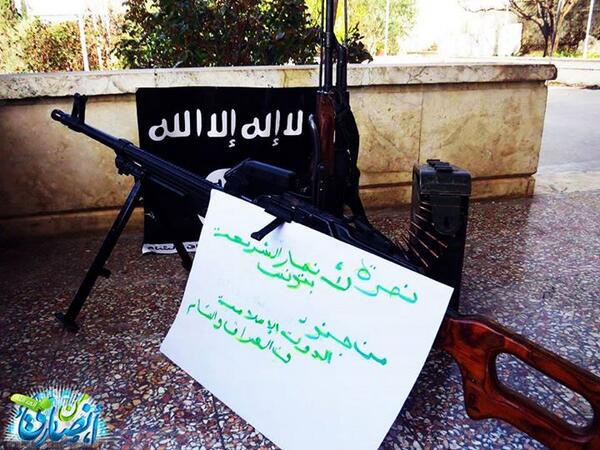
Another representative photograph posted as part of the campaign, on February 26, featured a handwritten sign held up in front of a Saudi mosque that read: “Support for Ansar al-Sharia in Tunisia,” attributing this support to “your brothers from the Land of the Two Holy Mosques.” (For more coverage of AST’s “who are my helpers in the cause of Allah” campaign, see MEMRI’s report, referenced above.)
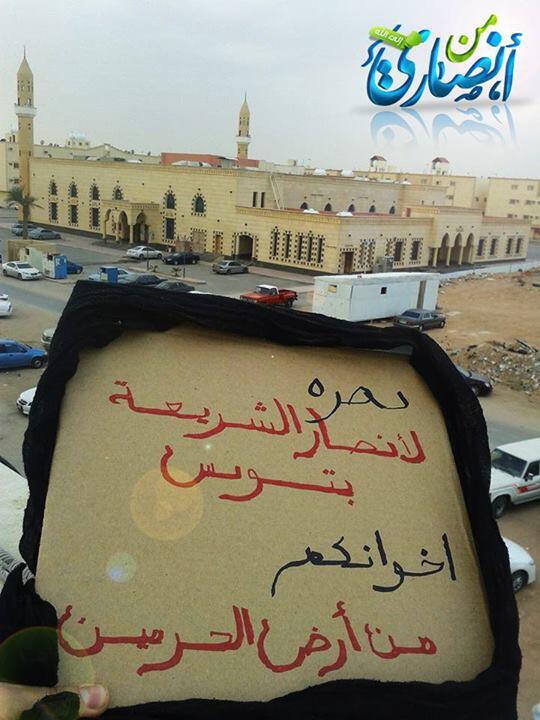
Anti-Government Propaganda
Another aspect of responding to the crackdown has been disseminating anti-government propaganda. Some of this propaganda has been supplied by outside scholars, including Abu Qatada al-Filistini, who has longstanding and deep connections to AST emir Abu Iyad al-Tunisi. Abu Iyad spent time in the United Kingdom, where Abu Qatada was also based, during his exile from Tunisia. Some jihadist forums have portrayed Abu Iyad as Abu Qatada’s “disciple,” and one AST member described Abu Qatada as “probably the most influential” jihadist theorist who has the group’s ear.
On January 21, AST posted a message from Abu Qatada, titled “An Important and Urgent Message to Ansar al-Sharia in Tunisia,” to all its social media platforms, including Twitter. Part of Abu Qatada’s message is devoted to attacking Ennahda, the Islamist political party that opted to work through electoral politics. Abu Qatada said that although Ennahda and AST seemingly share a common goal of “establishing Islam,” Ennahda moved in the “direction of the secularists,” and in the course of negotiations over the new Tunisian constitution accepted that sharia would not be the country’s source of law. According to Abu Qatada, Ennahda—which was in power when the crackdown on AST began—went even further astray “in their pursuing you [AST members] and attributing to you false actions that were used as an excuse to chase you and imprison you, and even to kill you.” Abu Qatada said that because Ennahda has allied itself with the secularists, it therefore shares in their judgment and fate.
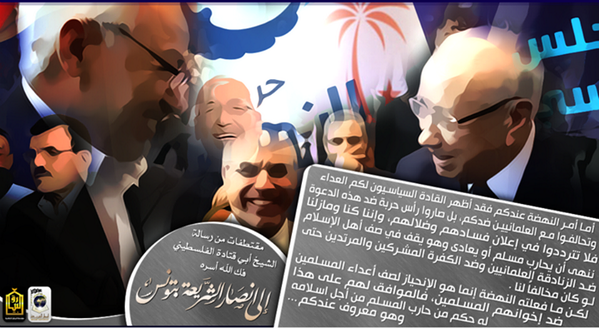
This graphic was tweeted on January 21, 2014,and includes excerpts about Ennahda from Abu Qatada’s message.
Thereafter, AST continued to press the theme that the Tunisian government had aligned itself with infidelity. On May 10, a tweet and accompanying graphic called on Muslims to fight the “leaders of infidelity,” and argued that Islam’s “powerful ability to protect itself” was the characteristic that would ultimately produce a victory.
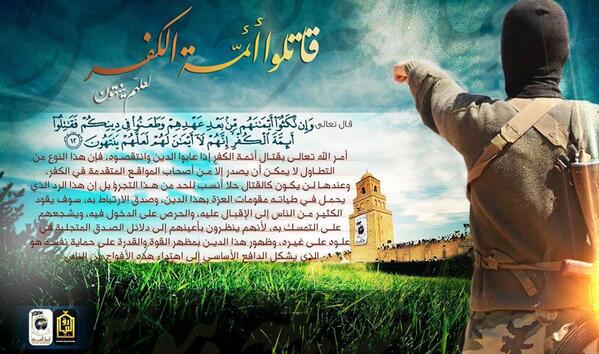
On May 20, AST posted a graphic titled “So that the nation will learn…” The accompanying text explained that “we do not label the tyrants infidels, nor do we repudiate them nor antagonize them and their friends due to their imprisoning, torturing, and persecuting us.” Rather, it explained that they label their opponents infidels “due to their imprisonment of monotheism and their detaining the sharia.” This statement reflects AST’s prioritization of its interpretation of sharia: it is unambiguously the most important value for which the group stands, and its suppression is more important to members, according to this statement, than even being subjected to imprisonment or torture.
These statements reflected AST’s understanding of both the general situation that it confronted as well as the clash of values between the group and the government. But some of its statements instead deal with specific incidents, such as “A Word of Truth and an Outcry in the Valley,” which was posted on April 15, addressing a recent raid in Rouhia in which security forces’ raid of a mosque resulted in the arrest of 40 salafists, reportedly including returnees from Syria. AST’s statement is one of solidarity with the arrested salafists, claiming that the group “follows what is occurring to you moment by moment, and we share in your pain and anguish.” Describing the Rouhia raid as one of the “crimes of the tyrannical Tunisian regime,” the statement describes a pattern of “harassment, intimidation, displacement,” as well as “the violation of the sanctity of homes and of women.” The statement calls on the people of Rouhia
